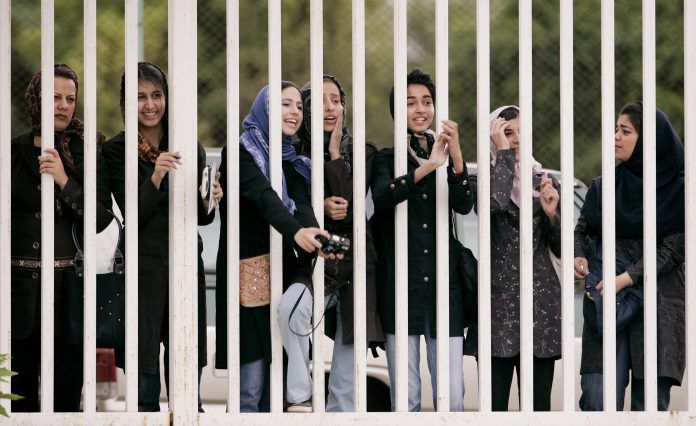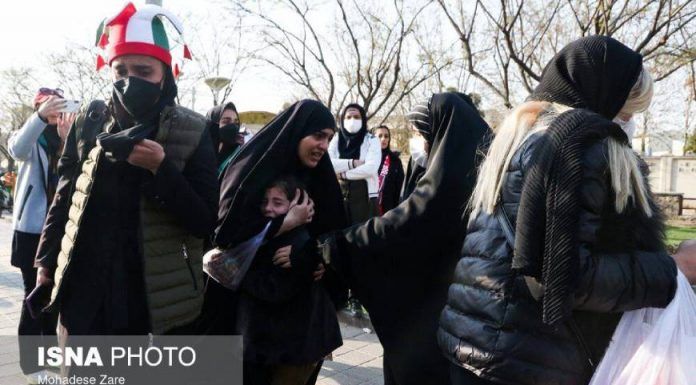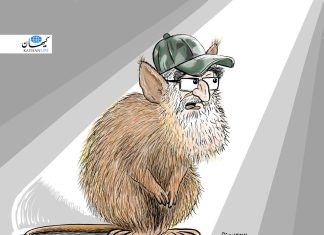
By Kayhan Life Staff
On March 29, authorities in the holy city of Mashhad, the capital of the northeastern province of Khorasan Razavi, prevented female football fans from entering a sports stadium to watch a match between the Iranian and Lebanese national football teams.
The incident sparked a public outcry and highlighted the ongoing discrimination against girls and women by the Islamic Republic and the country’s sports administrators.
Hundreds of female ticket-holders queued outside for hours in freezing temperatures before being told that they could not enter the stadium in Mashhad. The police reportedly used pepper spray and tear gas to disperse the crowd, who became angry after being denied entry into the stadium.
Footage shared on social media reportedly showed several girls and women in pain after being doused with pepper spray.
“On March 29, [authorities] attacked women with pepper spray to prevent them from attending a match between Iranian and Lebanese national football teams,” Kayhan London Tweeted on March 30.
The tweet included a video clip showing a massive crowd outside a stadium. While one woman said she had to wait two hours to buy two tickets, another spoke off-camera and shouted, “they used pepper spray.”
Footage showed several young girls washing their faces with bottled water after reportedly being doused with pepper spray. The clip also showed a large crowd of girls and women shouting, “we are protesting.”
“We followed Tehran’s orders,” Ali Akbar Hashemi-Javaheri, the director of Khorasan Razavi’s Department of Youth Affairs and Sports, said. “The provincial security council, and we follow orders.”
“Some of these issues should have been expected, given that Mashhad is the cultural epicenter of the Islamic world and Shia faith,” Mr. Hashemi-Javaheri added.
In comments reported by the Tehran-based Entekhab News Agency on March 30, Mehrdad Sarraji, a member of the Iranian Football Federation board of directors, said: “There are alarming reports regarding decisions by FIFA [International Federation of Association Football] and AFC [Asian Football Confederation]. I had previously warned those in the Ministry of Sports and Youth Affairs, whose policies resulted in the unfortunate event in Mashhad, that they will be held accountable for their decisions.”
“Today, the Islamic Republic’s thugs doused the faces of women who were refused entry into a stadium with pepper sprays,” the U.S.-based Iranian political action group, Iran Revival (Farashgard), tweeted on March 29. “Some 2,000 women with valid tickets were refused entry into a sporting stadium in Mashhad to watch a FIFA World Cup Qatar 2022 qualification match between Iranian and Lebanese national football teams. The angry fans shouted slogans outside the stadium’s gate, protesting the decision by the authorities not letting them into the stadium.”
The tweet included a video clip showing several young girls washing their faces with bottled water after reportedly being doused with pepper spray.
Some have suggested that Iran could be banned from FIFA World Cup Qatar 2022 altogether and be heavily fined if it continues to discriminate against female fans and excludes them from stadium matches.
Some political activists have called on international sports bodies to ban the Iranian national football team from international competitions, and penalize the Islamic Republic for refusing to allow women to watch matches in stadiums.
“Iranian national football team must be sanctioned and banned from competing in international competition for refusing entry to female spectators into large sports stadiums and discriminating against women football teams,” Hossein Ronaghi, a political activist, tweeted on March 29. “Penalizing and banning a misogynous system is a tool for advocating women’s rights, who are half of Iran’s population.”
Meanwhile, the reformist camp in Iran has used the recent incident in Mashhad to score points against President Ebrahim Raisi and his ultra-conservative government.
It is noteworthy that the conditions for women were not much different when the reformists had the presidency and controlled the Majlis (Iranian Parliament).
In September 2019, Sahar Khodayari, dubbed on social media as the “Blue Girl” — a reference to the colors of her favorite football team Esteqlal Tehran — set herself on fire after her trial for trying to enter a football stadium disguised as a man.
EXCLUSIVE- FIFA Officials to Visit Iran After Death of “Blue Girl”
Following her tragic death, the spokesperson for the reformist government of President Hassan Rouhani said the cabinet supported women’s rights to attend football matches at sports stadiums.
However, the conditions for women football fans have not improved since then.
Another social media user, Mahmoud Sadeghi, tweeted: “One person allows women spectators to attend matches in a sports stadium, another denies them entry by dousing their faces with pepper sprays. One person calls on the Islamic Revolutionary Guards Corps (IRGC) to give up [their demands] so sanctions may be lifted. Another accuses the person [proposing the idea] of surrendering to the enemy.”
“Those who believed a unified front is a way to solve the country’s problems were deluding themselves,” Mr. Sadeghi added.
After the World Cup qualification match in Mashhad, the Iranian national football team’s captain, Alireza Jahanbakhsh, said: “I do not understand why a section of the stadium could not be only for women. I do not think there would be any problem if that happened.”
Mr. Jahanbakhsh’s remarks were removed from an interview segment on the Islamic Republic of Iran Broadcasting (IRIB) TV channel.
Many social media users have urged FIFA to penalize Iran for its discriminatory laws against women. Some people have argued that the state even discriminates against devout Muslim women, given that many female football fans doused by pepper sprays outside the stadium in Mashhad wore a hijab, as seen in footage posted on social media.
They argue that even religious women in Iran are fed up with the state’s systematic discrimination against girls and women.
The mistreatment of female football fans has outraged even staunch supporters of the Islamic Republic.
“Hasn’t FIFA woken up yet?” Almira Sharifi, a news presenter at the IRIB’s Khabar (News) TV Channel, tweeted.
After receiving several warnings from FIFA, Iran made some efforts last year to accommodate female football fans by ostensibly allocating a section of sports stadiums to women spectators.
However, except for a handful of instances, authorities still deny entry to girls and women into stadiums to watch football matches.
FIFA has yet to take decisive action against the Islamic Republic despite the global condemnation of the country’s systematic and institutionalized discrimination against girls and women.
We must wait and see how FIFA will follow through with its warnings following the recent incident in Mashhad.
Nobel Prizewinner Shirin Ebadi Joins Campaign To Ban Iran From International Sporting Events








